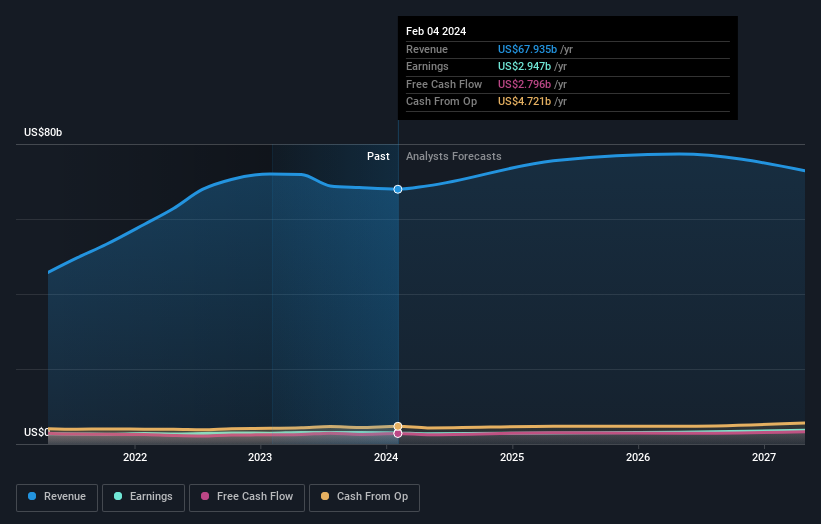Alimentation Couche-Tard Inc.'s (TSE:ATD) 3.5% loss last week hit both individual investors who own 46% as well as institutions
Key Insights
Alimentation Couche-Tard's significant individual investors ownership suggests that the key decisions are influenced by shareholders from the larger public
The top 25 shareholders own 47% of the company
Every investor in Alimentation Couche-Tard Inc. (TSE:ATD) should be aware of the most powerful shareholder groups. With 46% stake, individual investors possess the maximum shares in the company. That is, the group stands to benefit the most if the stock rises (or lose the most if there is a downturn).
While the holdings of individual investors took a hit after last week’s 3.5% price drop, institutions with their 36% holdings also suffered.
Let's delve deeper into each type of owner of Alimentation Couche-Tard, beginning with the chart below.
See our latest analysis for Alimentation Couche-Tard
What Does The Institutional Ownership Tell Us About Alimentation Couche-Tard?
Institutional investors commonly compare their own returns to the returns of a commonly followed index. So they generally do consider buying larger companies that are included in the relevant benchmark index.
We can see that Alimentation Couche-Tard does have institutional investors; and they hold a good portion of the company's stock. This implies the analysts working for those institutions have looked at the stock and they like it. But just like anyone else, they could be wrong. It is not uncommon to see a big share price drop if two large institutional investors try to sell out of a stock at the same time. So it is worth checking the past earnings trajectory of Alimentation Couche-Tard, (below). Of course, keep in mind that there are other factors to consider, too.
We note that hedge funds don't have a meaningful investment in Alimentation Couche-Tard. The company's largest shareholder is Les Développements Orano inc., with ownership of 11%. With 6.0% and 5.4% of the shares outstanding respectively, Caisse de dépôt et placement du Québec and FMR LLC are the second and third largest shareholders.
On studying our ownership data, we found that 25 of the top shareholders collectively own less than 50% of the share register, implying that no single individual has a majority interest.
While studying institutional ownership for a company can add value to your research, it is also a good practice to research analyst recommendations to get a deeper understand of a stock's expected performance. There are a reasonable number of analysts covering the stock, so it might be useful to find out their aggregate view on the future.
Insider Ownership Of Alimentation Couche-Tard
While the precise definition of an insider can be subjective, almost everyone considers board members to be insiders. The company management answer to the board and the latter should represent the interests of shareholders. Notably, sometimes top-level managers are on the board themselves.
Insider ownership is positive when it signals leadership are thinking like the true owners of the company. However, high insider ownership can also give immense power to a small group within the company. This can be negative in some circumstances.
Our most recent data indicates that insiders own some shares in Alimentation Couche-Tard Inc.. Insiders own CA$3.2b worth of shares (at current prices). we sometimes take an interest in whether they have been buying or selling.
General Public Ownership
With a 46% ownership, the general public, mostly comprising of individual investors, have some degree of sway over Alimentation Couche-Tard. While this size of ownership may not be enough to sway a policy decision in their favour, they can still make a collective impact on company policies.
Private Company Ownership
Our data indicates that Private Companies hold 14%, of the company's shares. It's hard to draw any conclusions from this fact alone, so its worth looking into who owns those private companies. Sometimes insiders or other related parties have an interest in shares in a public company through a separate private company.
Next Steps:
It's always worth thinking about the different groups who own shares in a company. But to understand Alimentation Couche-Tard better, we need to consider many other factors. Consider risks, for instance. Every company has them, and we've spotted 2 warning signs for Alimentation Couche-Tard you should know about.
If you are like me, you may want to think about whether this company will grow or shrink. Luckily, you can check this free report showing analyst forecasts for its future.
NB: Figures in this article are calculated using data from the last twelve months, which refer to the 12-month period ending on the last date of the month the financial statement is dated. This may not be consistent with full year annual report figures.
Have feedback on this article? Concerned about the content? Get in touch with us directly. Alternatively, email editorial-team (at) simplywallst.com.
This article by Simply Wall St is general in nature. We provide commentary based on historical data and analyst forecasts only using an unbiased methodology and our articles are not intended to be financial advice. It does not constitute a recommendation to buy or sell any stock, and does not take account of your objectives, or your financial situation. We aim to bring you long-term focused analysis driven by fundamental data. Note that our analysis may not factor in the latest price-sensitive company announcements or qualitative material. Simply Wall St has no position in any stocks mentioned.

 Yahoo Finance
Yahoo Finance 

